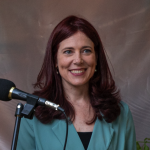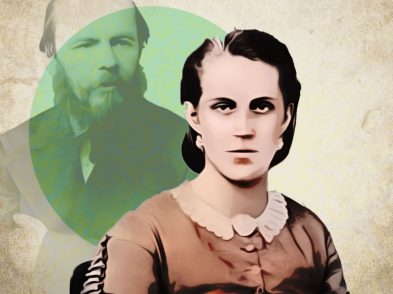The Florentine and its sister communications company Flod are pleased to welcome partners of the shemakes project to Florence.
Shemakes is an EU-funded project that addresses the gender gap in the textile industry, encouraging women in innovation and leadership with the hopes of creating a more sustainable future. In dialog with the project’s Florence consortium meeting this September, we’ve interviewed the heads of six female-led realities in Tuscany – businesses, cooperatives, workshops and a historic foundation – to discuss their work with sustainable textiles, clothing and home décor in Florence and environs. If you think the world of fashion is the last place to look for values for the future, these interviews will surprise you.
Flo Concept Store, Florence – Elisabetta Renzoni, founding partner
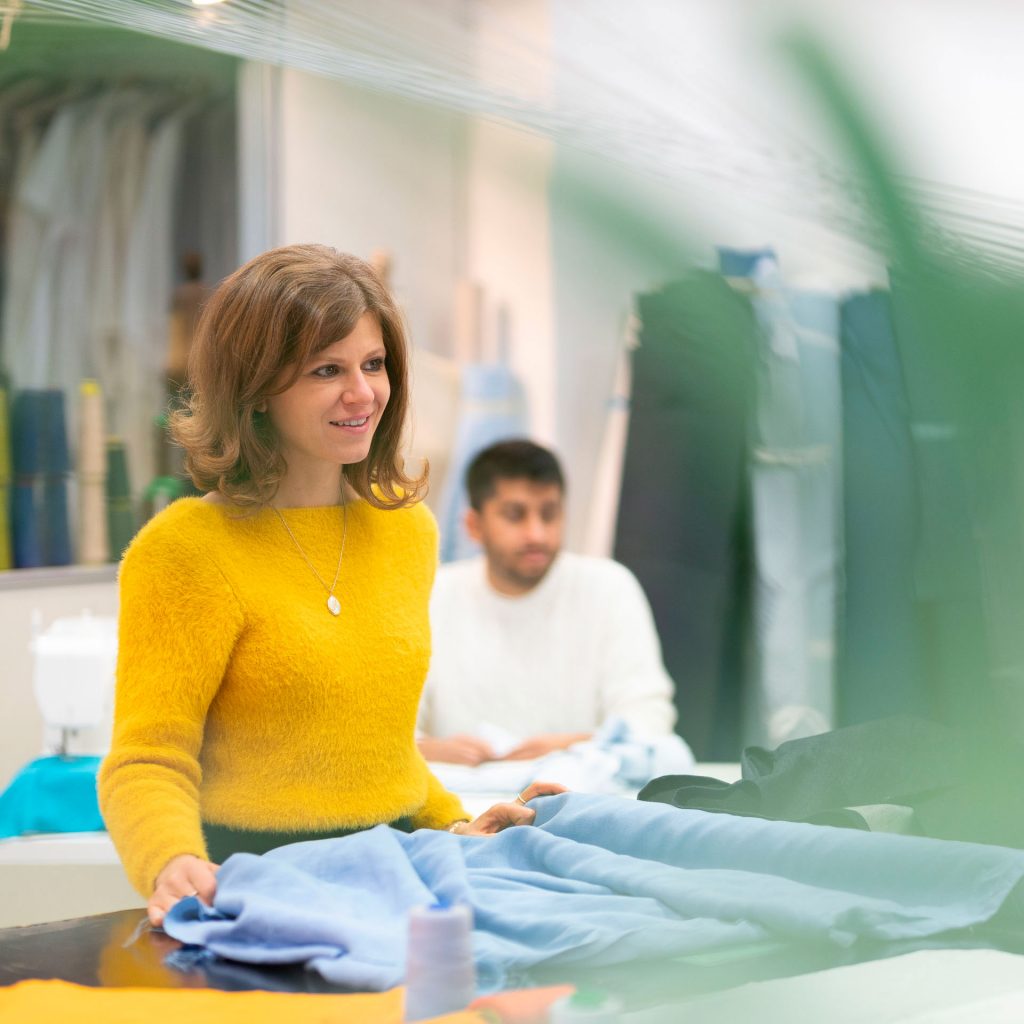
“Style is the mirror of the soul, and although fashion is associated with appearances, as a social cooperative, we like to look at the world ‘beyond the mirror’, at the people who produce clothes in our workshop on Via Cimabue. Working in a protected environment like ours – with something beautiful like textiles – inspires a sense of calm. That’s a starting point, as we strive to give people who are disadvantaged or disabled the opportunity to acquire their own professional dignity through training and employment. For more than a decade, Flo Concept Store (Lungarno Corsini 30, Florence) has been dedicated to displaying the high quality, zero-waste products we make for our women’s wear and children’s collections, using fabrics donated or discarded byhigh fashion brands. In a word, we look to create social sustainability within a circular economy, because that is the only way to foster social justice in the world of fashion.”
Tiche Clothing – Tijana Stankovic, founder
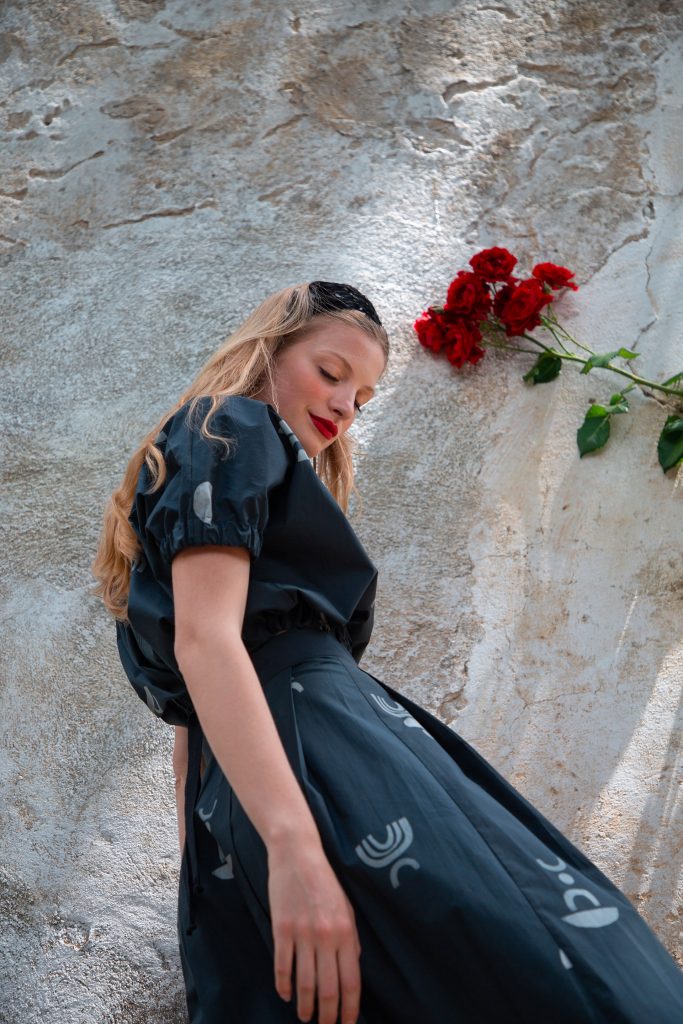
“Sustainability is linked to timelessness. I don’t mean to say that our clothes will last forever, but almost! It’s not about producing outfits for one season – so I look to classic styles, like designs reminiscent of the 60s and 70s or those inspired by Orientalism from the early 1900s. I believe that clothes can be like a work of fine art – something that lasts over time and that can be inherited. Thanks to our workshop and showroom in Via San Zanobi 122r, I have direct contact with clients. Seeing them wear what I’ve made is the best way to understand their needs. Older women often want their knees and arms covered, but younger women are no less self-conscious in other ways. It moves me to create something that women can feel beautiful wearing, no matter what! Tiche – the company’s namesake – is the Greek goddess of Destiny, and my own name, Tijana, is a variation of it. She brings good luck, and I want the clothes I make to bring luck to the wearer.”
Fondazione Arte della Seta Lisio – Elena Baistrocchi, Director General
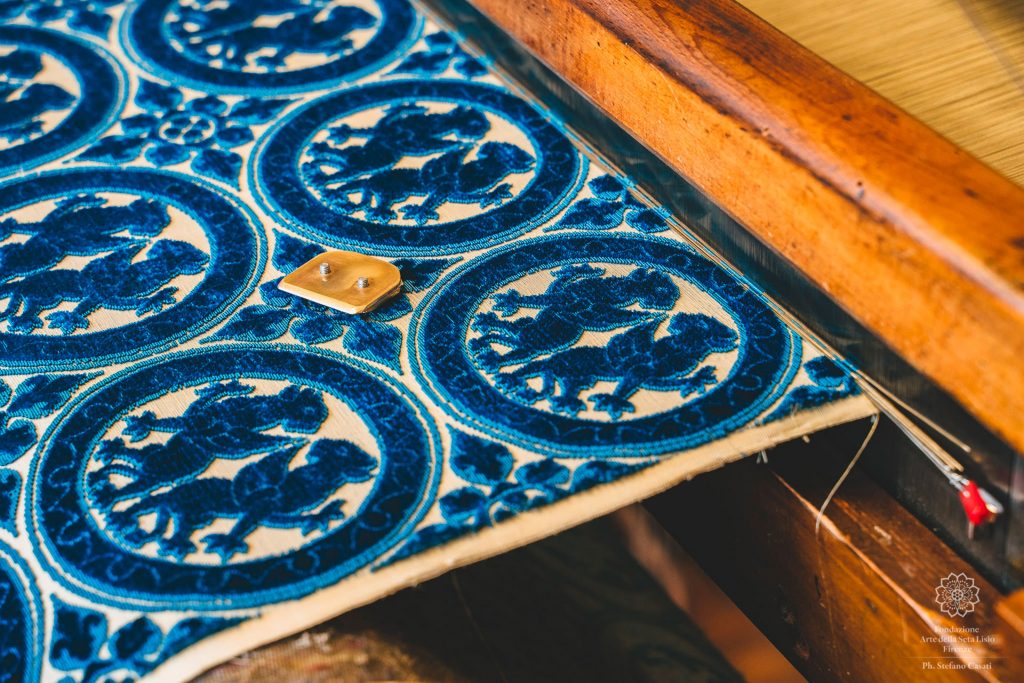
“Artisanship is unifying force. In the apprentice phase, trainees learn to build relationships with someone who teaches them skills and shares their same values. In the second phase, their self-awareness grows, and artisans begin experimenting with personal creativity. In life, we’d compare it to the generational process that plays out between daughter, mother and grandmother. The ‘grandmother’ is the master artisan who wants to pass on her knowledge. That is the only way her work can become part of our universal heritage, otherwise, her expertise – and the craft from whence it came – is lost. The mission of Fondazione Arte della Seta Lisio’s (Via Benedetto Fortini 143, Florence) is the preservation of artistic silk production, and that includes passing the craft on for posterity. To this end, in addition to producing our velvets and brocades, we’ve developed a center for restoration and research, where we offer numerous courses like ‘Lace Analysis’ and ‘Recognition of Textiles’ for conservators, and even a course in which veteran technicians teach young mechanics to fix our manually-operated Jacquard looms, built in the 1800s. Intergenerational exchange is key to continuance.”
La Serra MK Textile Atelier – Margherita Pandolfini, co-founder
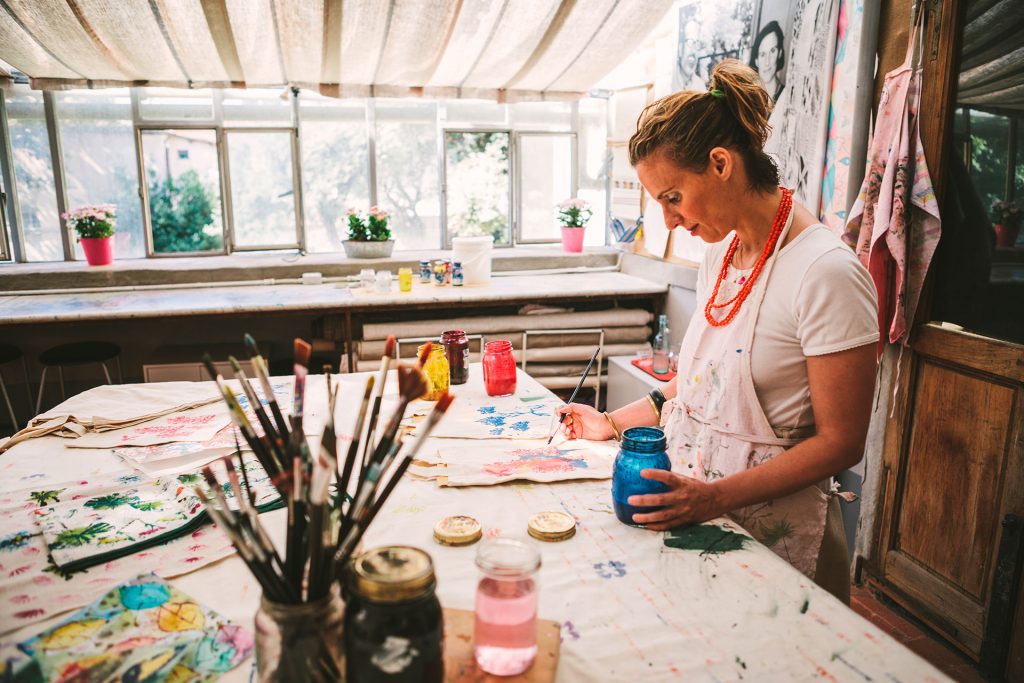
“As far as my background is concerned, I studied Fine Art and Sculpting and have always been interested in color and textures, drawing much of my inspiration from light and nature. Karl [Jorn], my co-founder, resonates more with geometric forms and architecture. Our workshop used to be a greenhouse, a nineteenth-century addition to the building built in the 1400s. There is living light in this place! With La Serra MK Textile Atelier (Via Salvestrina 1, by appointment only), my work is two-fold. I create serigraphic works for home décor and tableware which is often custom-ordered. In addition, I hand paint artistic panels. Sustainability in this field is associated with using natural fibres or dyes that are not harmful, that’s one part of it, the other side is not technical… it has to do with creativity and lies in versatility… in allowing our company to evolve right along with us.”
Spazio NOTA, OMA – Martina Antoniucci, Educational Coordinator
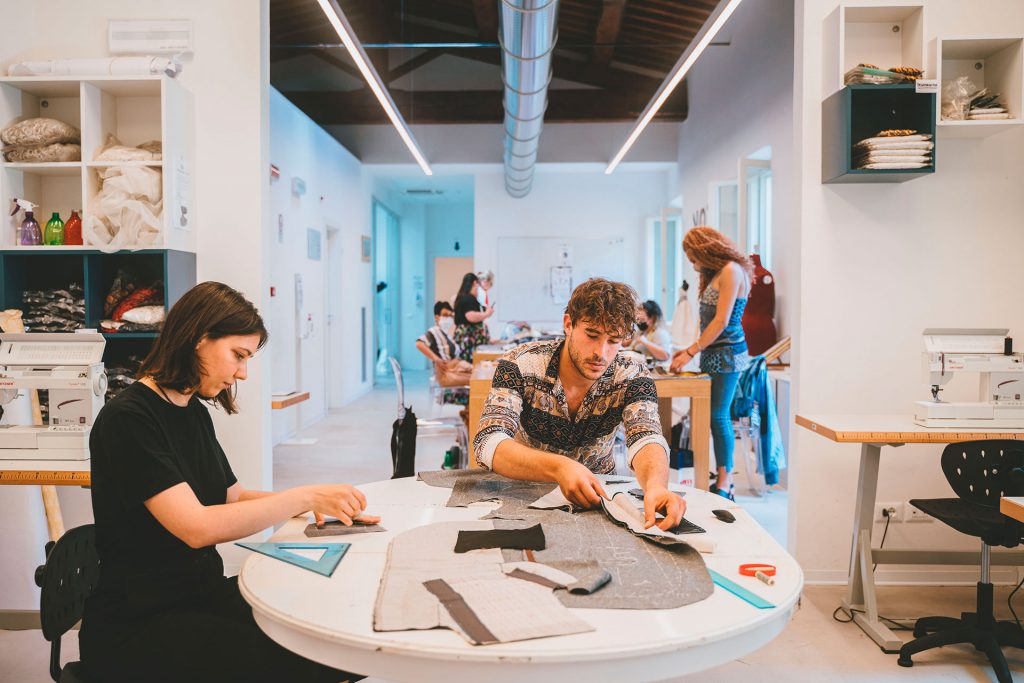
“In the heart of the Oltrarno, at Via Serragli 104, Spazio NOTA is a project and a center established by the Fondazione Cassa di Risparmio di Firenze to safeguard and promote the creativity and traditional craftsmanship in the field of fashion. Thanks to the management of OMA, we provide high-level vocational training for sector professionals and students, with a special focus on emerging generations. To give you an idea, courses range from pattern-making of shirts with collars to how to make corsets or sew drapery. We also host specialised courses like ‘La Bella di Tiziano’ which is inspired by a painting by Titian in the Pitti Palace; we recreate sixteenth-century costumes that are donated to the Madonne Fiorentine, the women who dress in historic costume for official City of Florence processions and events. Extremely practical and taught by professional artisans, these intensive courses include design, patternmaking and garment-making, taking us through all the steps from the conference room to the cutting room, into the sewing room and beyond into real life, where fabric becomes a three-dimensional creation.”
Lottozero, Prato – Arianna Moroder, co-founder and partner
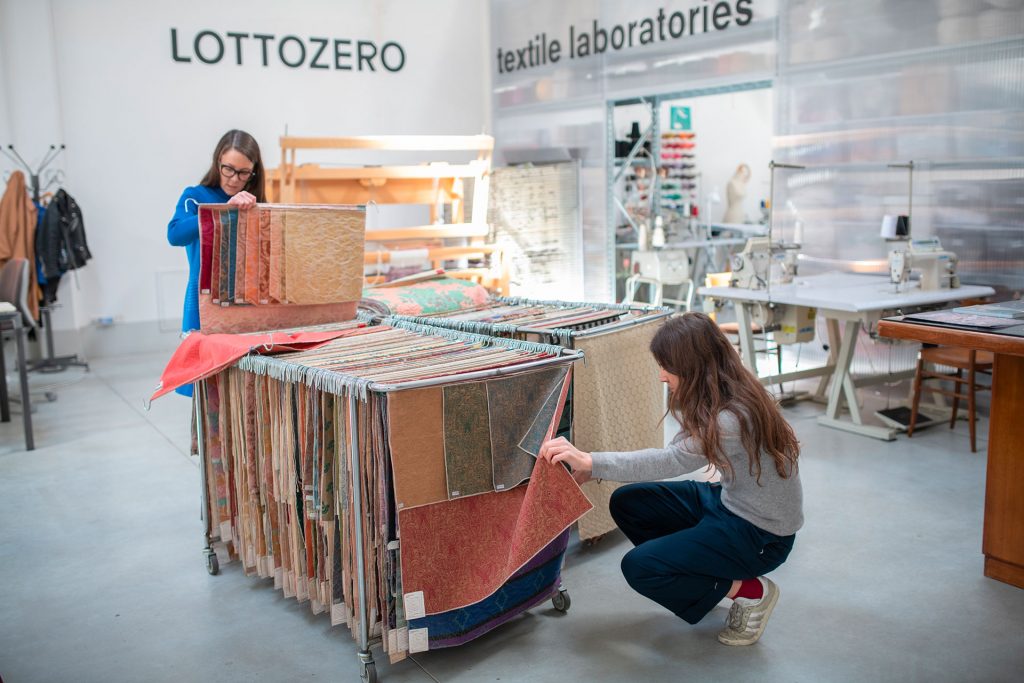
“When you work at a high level and produce high quality fashion, that, in and of itself, is ‘sustainability’. Lottozero (Via Arno 10, Prato) is a center for textile design and a lab for textile production and research. One of our main goals is to support young people. In fact, we were born with the objective of bringing innovative ideas to the traditional textile industry, which is very much ‘an institution’ in Prato, so introducing new minds to the industry is a central value guiding our work. Sometimes we achieve it through artist residencies or we host workshops and develop specialised projects for emerging artisans. In our Lottozero Directory, we bring together a series of businesses – small brands made up of independent fashion designers and tailors – giving them visibility through our platform, because communication is important. It is a way of spreading the word, shining a light on Italian brands and promoting them to a community of buyers who pay careful attention to the issue of sustainability.”

This project has received funding from the European Union’s Horizon 2020 research and innovation programme under grant agreement No 101006203.
The views expressed herein reflect those of the author and the shemakes consortium; the EU Commission is not responsible for any use that may be made of the information it contains.



